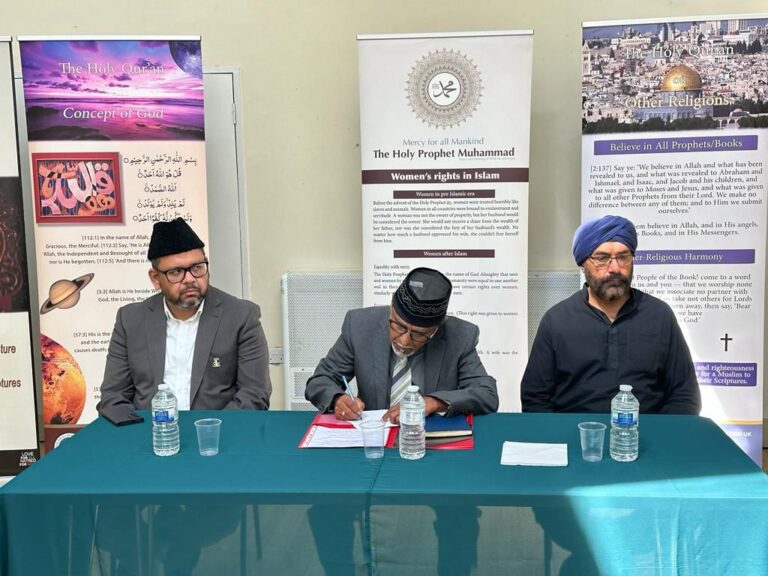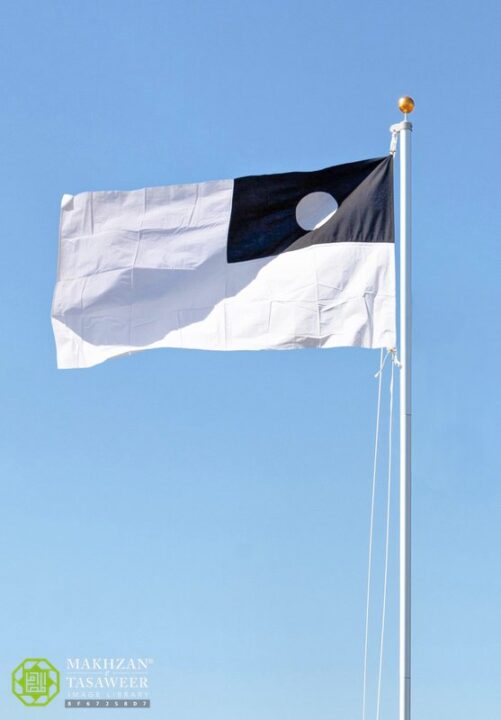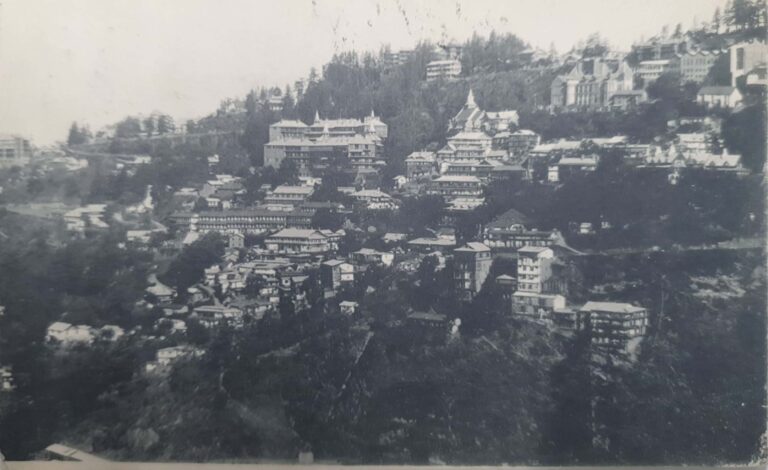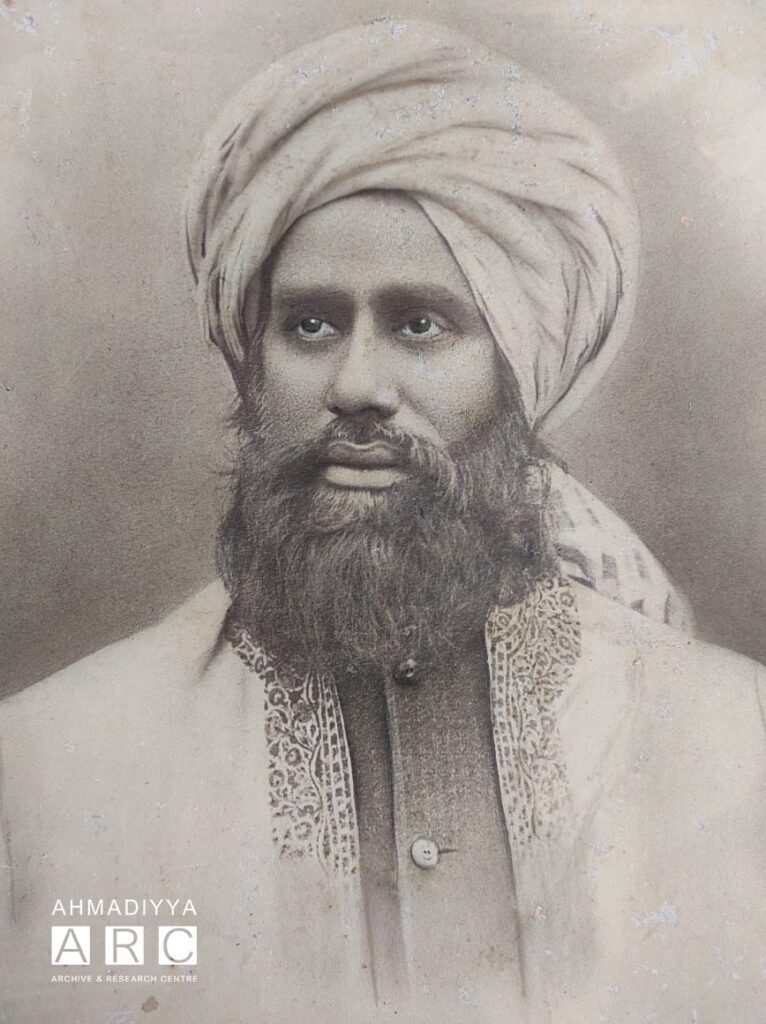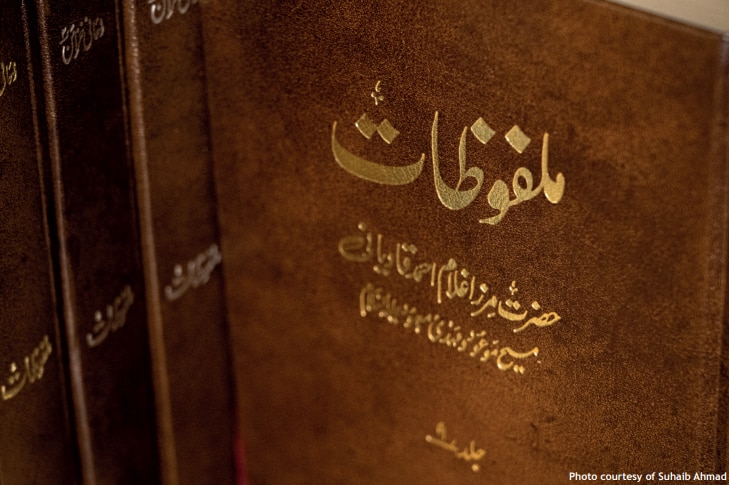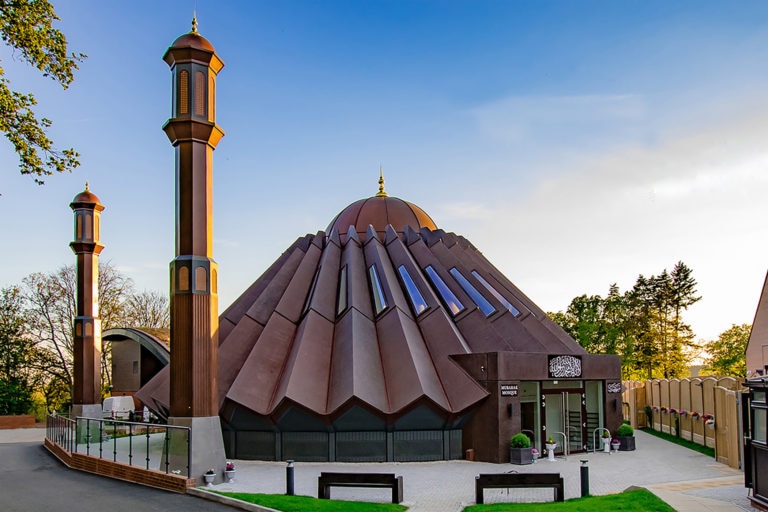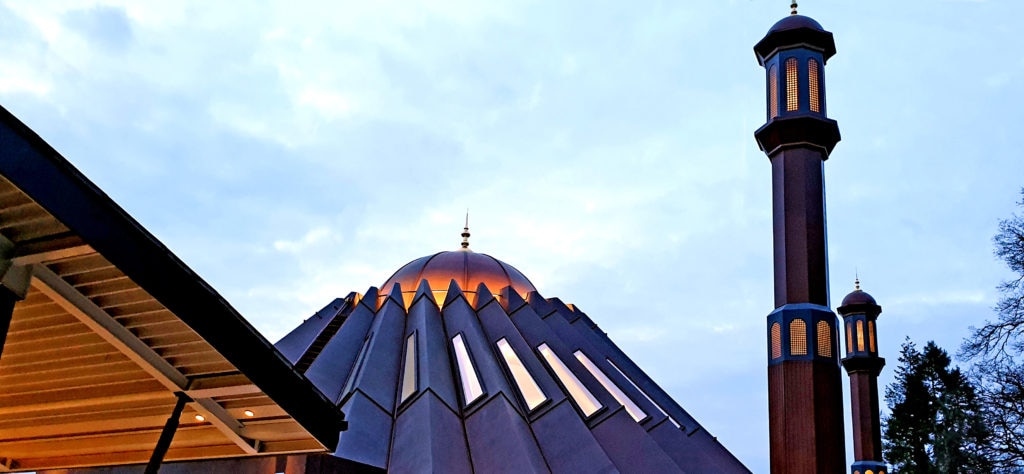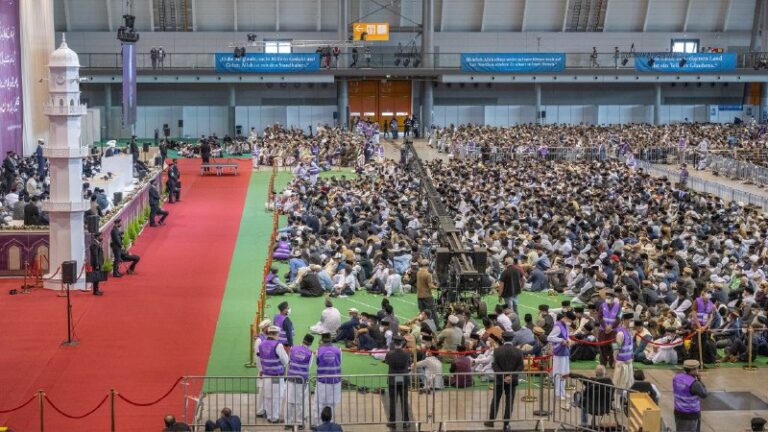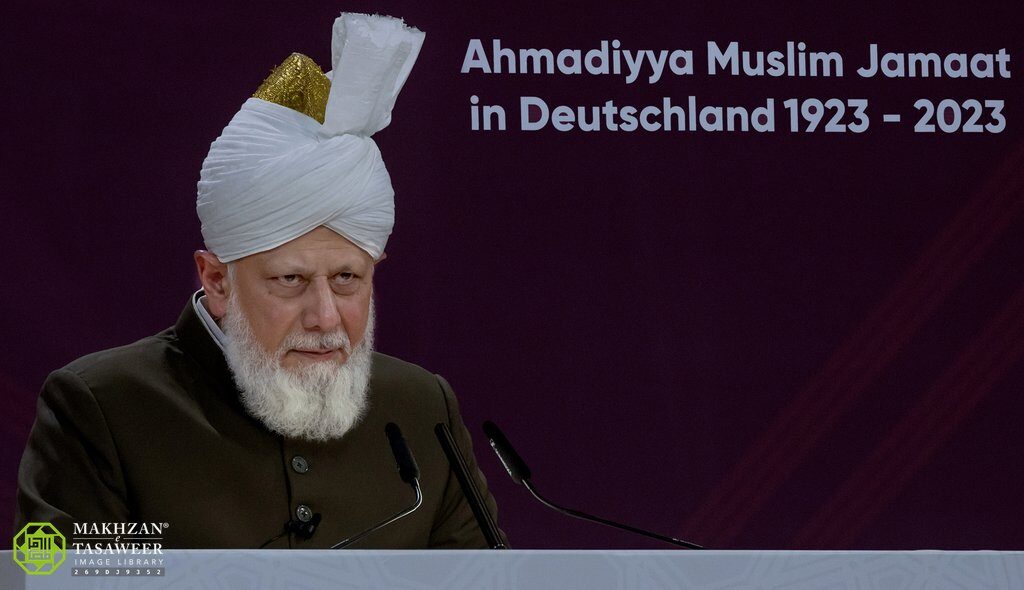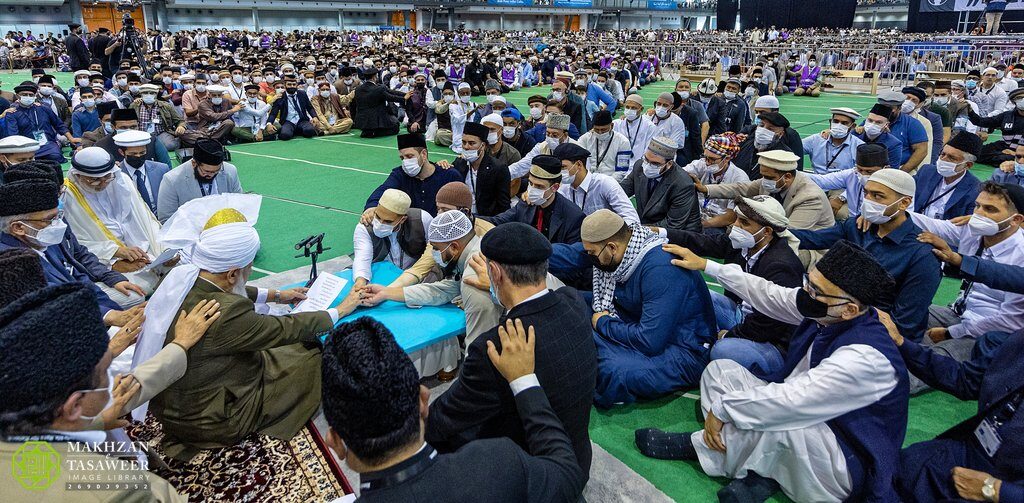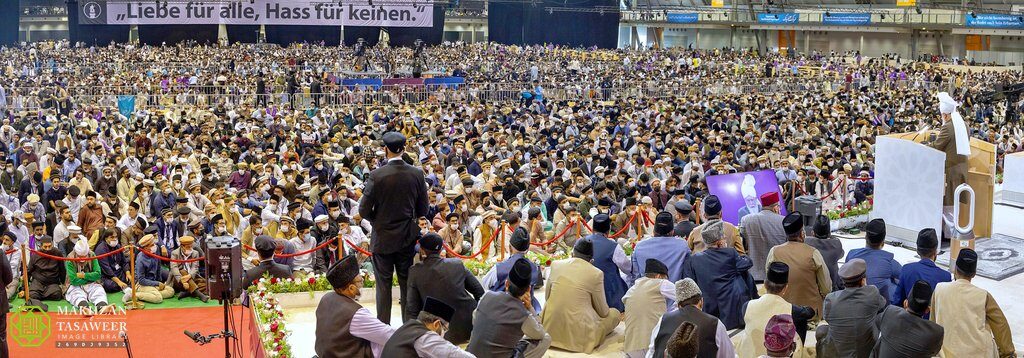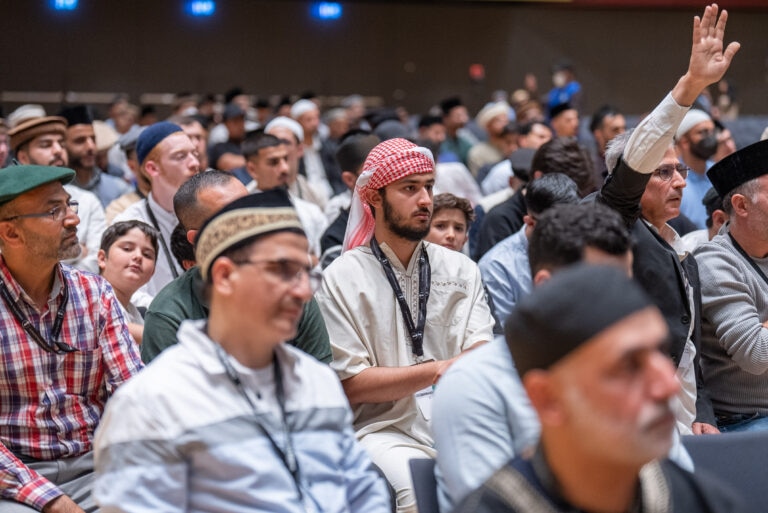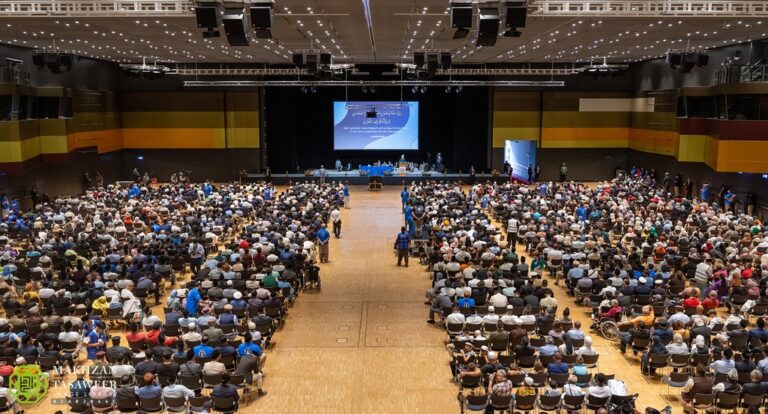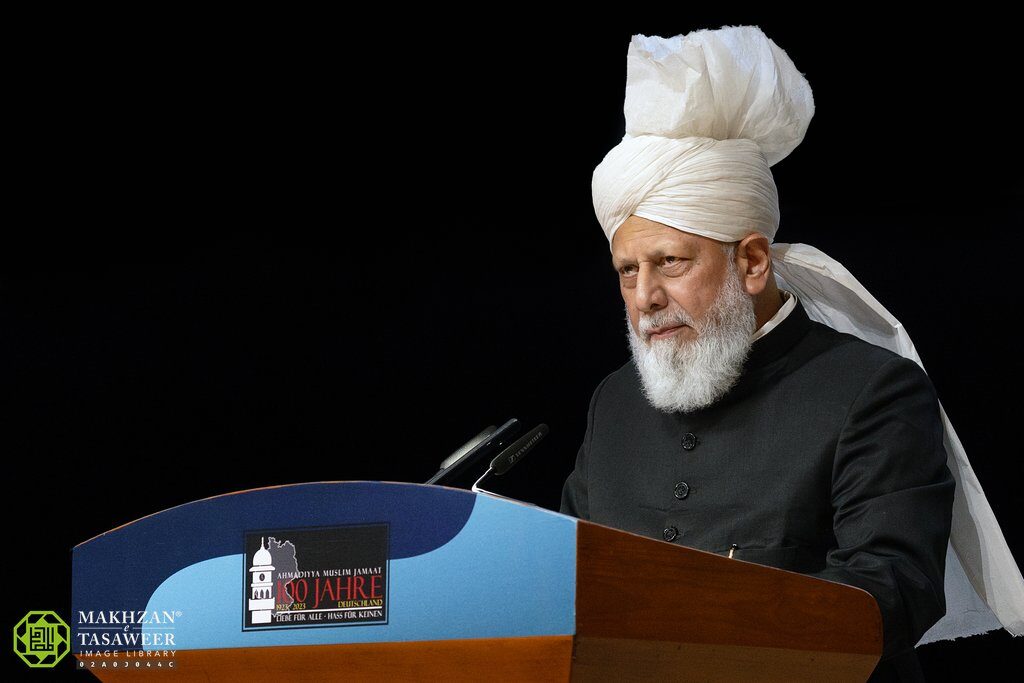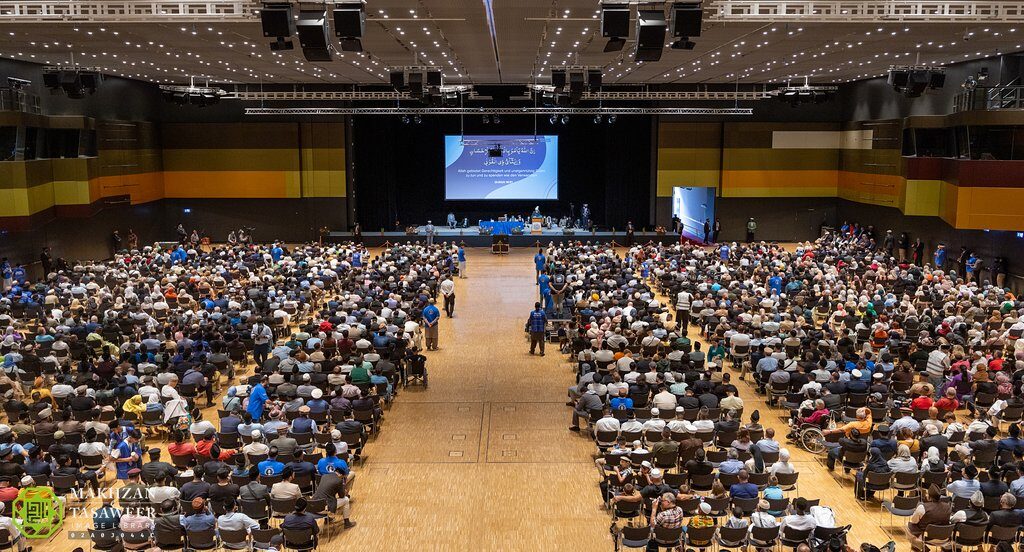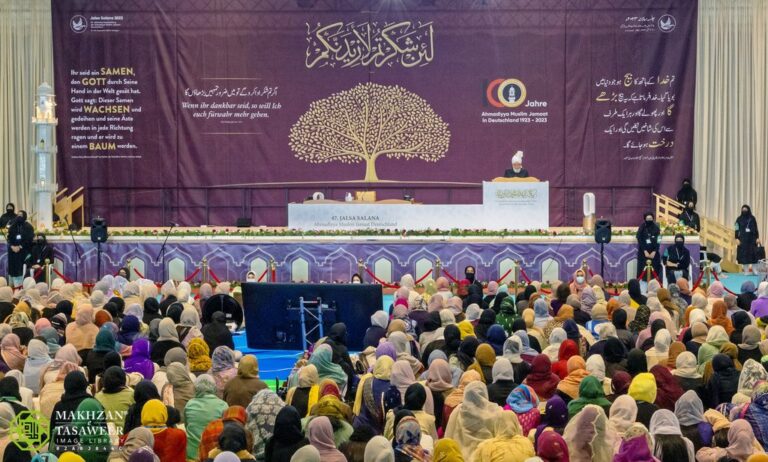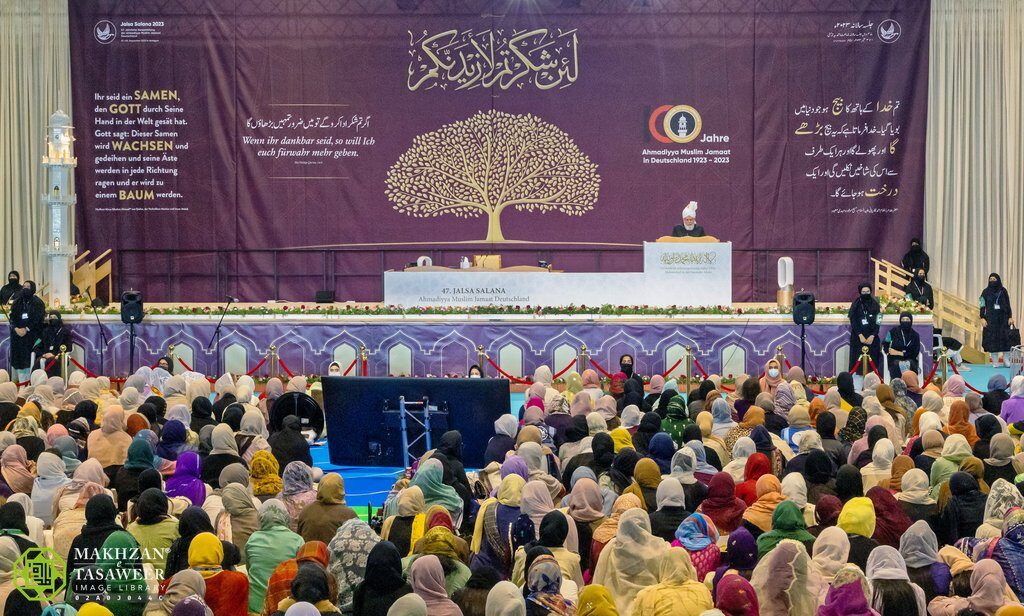Friday Sermon
11 August 2023
Islam Ahmadiyyat: Faith-inspiring stories
After reciting the tashahud, ta‘awuz and Surah al-Fatihah, Hazrat Khalifatul Masih Vaa stated:
The blessings of Allah the Almighty that are showered upon the Community of the True Servant of the Holy Prophetsa in accordance with the promise of Allah the Almighty are mentioned in the report during Jalsa. In the report, I said that it is not possible to mention everything in such limited time with regards to how Allah the Almighty bestows His blessings; how Allah the Almighty opens the hearts of people towards the Community; how Allah the Almighty strengthens people’s faith and how He leaves the enemies unsuccessful. People write countless incidents to me and I will mention some of them today as well, because these incidents become a means of strengthening the faith in the hearts of many Ahmadis.
In relation to how Allah the Almighty enables fortunate souls to enter the fold of Ahmadiyyat through various means of tabligh [preaching] and how new chapters of the Community are being established, Hameed Sahib, the local missionary in Congo Kinshasa, where we also have an FM radio station, writes the following,
“After listening to our radio programme in Uvira, the imam of the local mosque, Isa Sahib, contacted us and then came to the mission house. He understood the message of the Community and pledged allegiance. As a matter of fact, not only did he pledge allegiance, but he returned to his village, Kiliba Ondezi, and started doing tabligh as well. As a result of his tabligh, 24 individuals entered Ahmadiyyat. When our central missionary went there for a visit, another eight individuals pledged allegiance. In this manner, a jamaat was established there.”
Now, on the one hand, we see how Allah the Almighty enabled this good-natured imam to listen to and understand the message, and on the other hand, the [so-called] scholars in Pakistan know nothing besides opposing the Community.
Umar Munawwar is a mu‘allim and was sent to a village in the district of Mai-Ndombe in Congo Kinshasa for the purpose of tabligh. He visited a mosque belonging to Wahhabi Muslims and distributed pamphlets to the people as well. Some mischievous youngsters started raising a hue and cry outside the mosque and started pelting him with stones. It is often said that people in Africa are unlettered and therefore willing to listen to what we say, but there is opposition there as well. The mu‘allim protected himself from the stones and continued preaching to the others, who were extremely impressed by his patience and forbearance. As a result of this, some of those who had left the mosque, came inside again and started listening to what he was saying. Questions about the Community were asked, allegations were raised and many questions were answered. One mischievous young man who was talking boldly said: “You go to London in order to perform Hajj, whereas the Holy Prophetsa performed all of his pilgrimages in Mecca.” The mu‘allim said to him: “Tell me, how many times did the Holy Prophetsa perform Hajj?” Upon this, the young man said: “The Holy Prophetsa performed Hajj every year since he was born.” The mu‘allim said: “The Holy Prophetsa only performed Hajj once.” The imam and elders sitting in the mosque reprimanded the youngster and said that he was just creating disorder. Nevertheless, these mischievous individuals were embarrassed and left. Afterwards, the imam of the mosque took the delegation of the Community home, where two other imams and some other individuals were present as well. As such, 40-42 individuals were positively impacted by the tabligh of the Ahmadiyya Community and pledged allegiance and a new chapter was established there as well.
Imam Tamane of Guinea Bissau says, “To this day, we have been told that the [Ahmadiyya] Community does not accept the Holy Prophetsa, the Quran or the Hadith. However, today we have witnessed the Jalsa programme.” He says, “With the blessings of this Jalsa, we have had the opportunity to see and listen to your Khalifa, who imparted guidance purely in light of the teachings from Allah the Almighty, the Holy Prophet Muhammadsa, the Quran and the Hadith. Today, I am convinced that false propaganda is being spread against the Community, and false propaganda is always spread against divine communities.” The imam from this very mosque says, “Today, I enter the fold of Ahmadiyyat and shall preach the message of the Community to all my people.” By the grace of Allah, he is doing tabligh and new local chapters are being established.
Therefore, as for our opponents in Pakistan, they should not oppose us merely for the sake of opposition, rather, they should listen to, read and understand our teachings, and then present whatever allegations they may have. This is what the Promised Messiahas said time and time again; that people oppose him, but they ought to first listen to what he has said.
The Amir of Liberia has written about how Allah the Almighty grants us support in spite of opposition, “Two years ago, a few people from the Ganaglay town of the Nimba County entered the fold of Ahmadiyyat. Prior to this, they were either Christians or non-religious. After pledging their allegiance, arrangements were made on a person’s veranda for the moral training of these people and for them to pray. One day, after completing the prayer, the local missionary Murtaza Sahib encouraged the people to pray that Allah the Almighty may grant them a suitable plot of land to build a mosque. This area is the centre of Christianity and non-religious people, and they do not see Muslims in a positive light, therefore, it was extremely difficult to procure land to construct the mosque. As he was still talking about this, Mr Dahn, a non-religious person who did not even believe in God, was sitting there, and stood up to say, ‘Ever since the missionary has been coming to our village, I have witnessed his very good morals. He meets everyone, and eats from the same pot, to the extent that he even comes to sit with me, an atheist and drunkard, and asks how I am. I have never seen such morals before. I have a plot upon which I wanted to build my home, but today I donated this land for the construction of the mosque.’ A few days later, he also pledged allegiance, gave up drinking alcohol completely, undertook a revolutionary change, and continued to progress in his sincerity. He progressed in his sincerity to such a degree, that people witnessed how he changed into a completely different person. The construction of the mosque began there, and the people complained to the chief that he should not permit the building of the mosque. However, Mr Dahn said with great courage, ‘I gave the land for the mosque, and it shall be built here.’ Thus, the construction of the mosque was completed, and this was the first mosque in the area. It was named Masjid Noor.” This is how, by the grace of Allah the Almighty, non-Muslims and even atheists who do not believe in God, not only attain certainty in the existence of God, but also accept Islam as the true religion.
In the Nyanza Lac city of Burundi, the Community faces a great deal of opposition as other Muslims reside there as well, and the imam of the Sunni mosque made every effort to close down the Community’s mosque. He even tried meeting with government officials, but to no avail. Our mu‘allim, Hamza Endowimana, called that imam for a question and answer session. During this session, the topic of the death of Jesusas was discussed. When the mu‘allim proved the death of Jesusas through Quranic evidence, this self-proclaimed scholar was left with no answer. Consequently, he started to fight with the mu‘allim and issued an edict of disbelief against the Community. Thereupon, a Christian stood up and supported the Community’s stance, making it clear to the cleric that the Ahmadiyya Community is indeed Muslim. [The Christian] said that the imam’s concept of Islam does not make sense, whereas theirs [i.e., the Ahmadiyya Community’s concept] is easy to understand. On the other hand, a quarrel broke out among those clerics in their mosque, leading the government to get involved. The government had to shut down their mosque for three months.
They wanted to have our mosque closed down, but their own mosque closed down instead. This is the scheme the so-called scholars are employing everywhere in their attempts to close down Ahmadi mosques. Similar to what happens in Pakistan, if the mosques are not shut down, they break the minarets or arches. Nowhere in the law of Pakistan is it stated that Ahmadis are not permitted to build minarets, however, the government has no choice but to bow down to these so-called scholars and clerics. In any case, they are exerting their full efforts to cause harm in any way, however, God willing, they themselves will all perish. In Pakistan, we are prohibited from publishing the Holy Quran, let alone its translation. Publishing even just the Arabic script is considered an unforgivable crime. In fact, some people have faced such harsh treatment, and there have been cases as well, just because they were listening to the recitation of the Holy Quran, or playing a recording of it. This is now the Islam now of these self-proclaimed clerics. These clerics have completely distorted the religion. In parallel, observe how Allah the Almighty is opening paths for us; how we are publishing the Holy Quran in various countries of the world, and how the copies of the Quran that we publish are liked everywhere, especially the translations. No matter what language they are in, people are attracted towards it.
A mu‘allim in Darus Salam, Tanzania, says that he went to distribute pamphlets in an area. He also sells books of the Community, through which tabligh contacts are made. He says, “One day, I received a phone call from a non-Ahmadi person who lived 30 kilometres from me, that he wished to purchase the Swahili translation of the Holy Quran.” The mu‘allim told him he could find the Quran in a nearby area. However, the person replied, “I really like the translation and commentary of the Community. By all means, others have also translated it, however, the way in which the Community has translated it is what I enjoy, as it makes logical sense, and so this is the one I wish to obtain.”
Bilal Sahib, a missionary in Mali, says, “The Ahmadiyya Community had the honour of holding a Quran exhibition. A student came to the stall and was introduced to the French translation of the Quran. He was informed that of the French translations of the Quran, the translation done by the Community is the best. Upon this, this young man said that he already had a copy of the French translation at home, which is better than the one produced by the Community. In any case, he went home and brought the Quran. He then spent over an hour stating how his translation was better than ours. He continued to compare the two translations. He was just-natured and in the end, had no choice but to deem the translation of the Community to be much better, and in reality, it was much easier to understand the Quran through it. He then purchased a copy of the Quran to take with him.”
There is an incident about how knowledge of the true teachings of Islam and belief in Allah the Almighty increase amongst the Muslims, who are pious-natured, owing to the teachings of the Community and the literature of the Promised Messiahas. In the Jorhat Book Fair, a gentleman named Jalimaus, who is a software engineer, came to the Community’s stall and began looking at the picture of the Promised Messiahas and the Community literature. After a while, the aforementioned gentleman began speaking with our missionary, who was on duty and had tears in his eyes. He said: “Today, if I am able to stand before you as a Muslim, then it is only due to the Ahmadiyya Community. The Ahmadiyya Community has conferred a great favour upon me.” He was asked whether he was an Ahmadi and what favour the Community had conferred upon him. He replied: “I am not an Ahmadi, but I drifted so far away from religion that I became an atheist. However, in my home, my father has a few old books of the Ahmadiyya Community that were written by Hazrat Mirza Ghulam Ahmadas Qadiani. I studied those books in which the Promised Messiahas gave proofs for the existence of God Almighty, which opened my eyes and left me astounded. I became convinced of the existence of God Almighty.”
In this way, even people who had become atheists are able to find belief in their faith again owing to the literature of the Community. He further said: “I now regularly study the website of the Ahmadiyya Community. The arguments presented by the Ahmadiyya Community in favour of Islam strengthen my faith and also increase my knowledge. It is because of the Ahmadiyya Community that I am a Muslim today.”
In the West, there are countries such as Sweden or Denmark that try to dishonour the Holy Quran, but when the beautiful teachings of Islam are presented to them, the attitudes of the opponents change. Thus, today, it is the Ahmadiyya Community alone that is striving to elevate the status and rank of the Quran and is explaining its true teachings to others. A German lady says that there was an exhibition of the Holy Quran and literature of the Ahmadiyya Community. The exhibition comprised different topics about Islam in light of Quranic verses and extracts from the Ahadith. These references highlighted how Islam is not an extremist religion. This lady said: “Your Community has explained the teachings of Islam in a manner that is easy to understand for us. I see no reason why we should oppose Islam or the Quran.”
How does the propagation of the Holy Quran and the literature containing Islamic teachings affect people? I will present another incident in this regard. “At the Golaghat Book fair, a Muslim professor named Shabana Yasmeen came to see our stall. (The person sending this report says) when she saw our stall, she was very happy. She picked up the Assamese translation of the Holy Quran (this exhibition was taking place in Assam) and said to her fellow professor: ‘My dream has come true today. For quite some time, I have been in search of the Assamese translation of the Holy Quran. I had a teacher who asked me for the Assamese translation of the Holy Quran on countless occasions. But because I did not have it, I was not able to provide him with it. This pained me greatly and I would have regretted being a Muslim [and not being able to provide the translation despite that]. After the demise of my teacher, today I have finally obtained a copy. Even if this cost thousands of rupees, I would have bought it.” It is only due to the blessings of Allah the Almighty that even in far-off places, where the Holy Quran and other Islamic books are not available for Muslims, the Ahmadiyya Community is able to fulfil their spiritual and religious needs through organising book fairs.
Then, during the Dhemaji Book Fair, there was a lady, Banti Dowaras Bogagohaian, who is currently constructing a temple for Shiva and propagates her faith – she is a Hindu. When she saw our stall, she was left astounded that in an area where there are very few Muslims, there is an Islamic book stall. She came to our stall and started a discussion. She returned very happy and content. The next day, she visited the stall again and brought fruit for everyone at the stall. It pleased her greatly to see the Holy Quran. She bought the Quran, and said: “Today, you have fulfilled a dream of mine.” She bought the Holy Quran and held it against her chest. She also took a picture with it.
The missionary for the Czech Republic, an Eastern European country, says that a youth came to our stall and said: “I have come to the conclusion that there is a God, but I do not know which religion will take me to God. For a number of years now, I have been studying various religions, but I have come to the conclusion that only the Ahmadiyya Community provides answers to everything in a way that satisfies my heart and mind. I feel a sense of spirituality here.” The Muslim clerics should answer the following question: Who is propagating the teachings of the Holy Quran to all these people?
There are also faith-inspiring incidents about how Allah the Almighty creates the means for avenues of tabligh to be opened. We are completely restricted in Pakistan; however, in other places, despite certain hindrances, Allah the Almighty creates ease. A missionary from Guinea-Bissau writes, “Last December, we visited Cape Verde Island. During this visit, a great need was felt for our Community to have a radio programme that could help spread the Community’s message even faster. However, despite many attempts, the Community was not being registered there, which subsequently meant that we could not have a radio programme.” He says that after completing the visit, a large number of leaflets were printed in Guinea-Bissau and were sent to Cape Verde, where they were widely distributed. He says, “After reading the leaflet, one person called the Community mission house and said that he wished to obtain more information about the Community, and so a meeting was arranged. He was informed about the Community, and then he said, ‘Why don’t you share your Community’s teachings on the radio?’ We told him that we have been trying, however we have been unable to secure a radio programme. Upon this, he said that he had his own radio station, and he was the director. We could conduct our programme with his radio station and spread the message of the Community.” In this way, Allah the Almighty opened a new avenue.
A missionary from Mali writes, “Ahmad Touray, who is from a village in the Koulikoro Region, came to the Jalsa Salana Mali and said that in Mali, there is a sect that does not give much importance to prayers and the pillars of Islam.” This sect does not give importance to prayers or the pillars of Islam, yet they still call themselves Muslims, whereas, [according to them] Ahmadis are not Muslims. He continued to say that, “he belonged to this sect, but his heart was not content. (He was pure-natured and expressed that although they say that there is no need for the pillars of Islam and faith or for prayer, his heart was not content with this). One day, he was listening to the radio and it happened to be a radio programme of the Community in which the proper manner of offering prayer was being taught. He listened to this very attentively, after which he constantly listened to the Community’s radio programme, which developed certainty within him that these people are true Muslims. However, the people in his village told him that all of the Islamic scholars have expelled them from the pale of Islam. He says, ‘When I saw people here offering prayers and tahajjud [pre-dawn voluntary prayer], I felt contentment in my heart. I do not know much about religion, but whatever I do know about Islam, I have witnessed here with my own eyes and I wish to enter the fold of Ahmadiyyat.’”
As I said, Ahmadis in Pakistan are banned from reading, listening to or even owning a copy of the Holy Quran, the final law-bearing book, and it is considered a great crime for them. Yet it is this very same book that the Ahmadiyya Community is using to spread the message of Islam to the world and thus reforming the world. The missionary in Micronesia, Serjeel Sahib, says, “Some time ago, a person by the name of Simon Gidon contacted me for a copy of the Holy Quran. Some time passed after that, and then unexpectedly, I received a message from him saying that he wished to come and meet me. When he arrived at the mosque, he said that he had read the Bible his entire life and in great detail, but despite his attempts, its teachings did not sit well with him and he was unable to understand anything. But when he started reading the Holy Quran, it was as if every word was entering his heart. He was astonished as to how it was possible for him to have been wrong his entire life and remain deprived of the Holy Quran’s teachings. After this, he went to his mother and told her that he was going to the mosque to enter the fold of Islam. His relatives were also present there and told him that he was making a mistake and chastised him. Upon this, he replied, ‘You can do whatever you like, but I am already a Muslim at heart.’” He says, “When Simon mentioned this to me, he had tears in his eyes.” Not only has he entered the fold of the Community, but he now bravely propagates its message.
Through the Ahmadiyya Community, pure souls around the world are entering the fold of Islam. The Amir of Spain writes, “After doing a great deal of research, a Spanish man by the name of Francisco Khaisos became a Muslim in January 2023. He accepted Islam as the true religion, but contemplated the lack of unity amongst Muslims. He felt that after the era of Hazrat Alira, the Muslims had been unable to unite (he had studied some Islamic history), and he felt that now Muslims could only be united under a system of Caliphate. Where could he find such a system of Khilafat? In March 2023, he came into contact with an Ahmadi named Tariq Sahib, who suggested that he research Ahmadiyyat. Hence, he researched Ahmadiyyat for three months, and after becoming content, he pledged allegiance and he now regularly attends the Friday prayers and other events.”
Khromov Turghan is from Tajikistan and resides in Kyrgyzstan these days. He says, “I work here in Kashgar and there were also some Ahmadis where I work (he then named some of them). I had conversations with them about the Community for about three years, after which I was convinced that Ahmadiyyat is the true Islam, that the Promised Messiahas is the Imam Mahdi, and that Jesusas has passed away. Hence, I pledged allegiance and entered the fold of the Ahmadiyya Community.” He then requests prayers saying, “Please pray that Allah the Almighty grants me the ability to serve in the cause of Islam, makes me righteous, and enables me to act according to the ten conditions of bai’at.”
A missionary from Russia, Ataul Wahid, writes, “Allah the Almighty drew the attention of a young man towards Ahmadiyyat. He lives in a small city and we came in contact with him about a year and a half ago. His father had moved away from religion, however, Marcel’s mother was an Orthodox Christian. Marcel (this young man) has an older brother who is also Christian. [Marcel’s] attention was drawn towards Islam due to his father’s native roots as he was originally a Muslim. And so, he was drawn towards Islam and accepted it, however, he accepted Sunni Islam. Even after accepting Islam he says that he would have many questions about the teachings and the local cleric could not provide satisfactory answers. The uneasiness grew and it was during this time that, through the internet, Allah the Almighty connected him to the Ahmadiyyat Community in Russia, from whom Marcel started receiving satisfactory answers to his questions. He says, ‘I went to many places in order to try and understand Islam, but I found the true Islam in Ahmadiyyat.’ Hence, he pledged allegiance.”
The missionary-in-charge in the Philippines says, “There are 139 people on an island here who pledged allegiance, including the principal of a school and two imams, as well as four imams of mosques. One of the imams of a mosque, Haji Isa said that the mosque for which he was an imam now belonged to the Ahmadiyya Community. Another person has gifted some land beside the mosque to the Community as well, where a mission house is intended to be built during the year, so that a permanent local missionary may be appointed. This imam also presents financial sacrifices. (It is not that he simply collects money; rather, he has a shop and a business and he makes financial sacrifices as well). One day, he said that he made a financial sacrifice of five hundred pesos, and then, in order to strengthen his faith, Allah the Almighty gave him a hundred thousand pesos unexpectedly from somewhere the very next day.”
This is how Allah the Almighty guides pure-natured people Himself.
The missionary from the Sikasso Region in Mali writes, “Marwan Kolibali came to the Ahmadiyya Mission house and said that he wished to pledge allegiance. He said that he fondly listened to Radio Ahmadiyya and agreed with the majority of the aspects related to the Community, but his heart would not let him pledge allegiance. He said that the day before, he fell asleep as he was listening to the radio and he saw in a dream that the moon was sparkling brightly in the sky and there were pictures of two people on the moon. One picture was large and the other was small, and the children nearby were crying out, ‘These are the pictures of the Imam Mahdi and his Khalifa. They have arrived.’ Marwan Sahib says that he asked an elder nearby whether he could see the pictures as well (in the dream), to which he replied that he could not. However, he says that his heart was content with the fact that Ahmadiyyat is the true Community that is announcing the coming of the Imam Mahdi.” When he saw pictures of the Promised Messiahas and the Caliphs, he recognised the larger picture to be of the Promised Messiahas and the other picture was of me and he said that these were the very pictures which he saw in the dream.
The Amir of the Community in Spain writes, “Carlos took the pledge of allegiance this year. He had become a Muslim earlier and was thus named Abdus Salam. In a dream, he saw the Promised Messiahas inviting him towards peace. After that dream, one day his wife was showing him something on the internet when he saw a picture of the Promised Messiahas. He remarked that this was the same person who was inviting him towards peace in his dream. Upon this, he started conducting research on Ahmadiyyat, and after a few days, he saw another dream. [In the dream], the Promised Messiahas said to him, ‘I am the Imam Mahdi and Messiah.’ Following this dream, although his heart had accepted Ahmadiyyat, he did not formally pledge allegiance and continued his research. He saw the Promised Messiahas in a dream for a third time, and this time there was an expression of displeasure on his face. Upon this, he contacted the Community immediately and pledged allegiance.”
Despite the relentless efforts of our enemies, new converts express steadfastness in their faith. An elderly member from Mahdi Abad, Burkina Faso, by the name of Syeed Wajeka says, “When the majority of our village accepted Ahmadiyyat, one of my cousins living in Saudi Arabia called us there and covered all of the travel expenses. When we arrived there, he took us to visit the Holy Ka’bah and said, ‘These are the holy sites of Islam. Islam originated here, not in Pakistan. Thus, adhere to the Wahabi beliefs here and renounce Ahmadiyyat. I said, ‘Did you bring us here to tell us this?’ He nodded in affirmation. Upon this, I responded, ‘I stand in the shade of this holy place and pray that a time never comes upon me in my life where I have to reject Ahmadiyyat.’” He further states, “At the Holy Ka’bah, I prayed that Allah the Almighty may take my life in a state of belief and that I never turn away from faith. After this, I swiftly returned to Burkina Faso. It so happened that the same cousin came to Burkina Faso to visit his family and relatives and Al-Hajj Ibrahim preached to him. As a result, he too entered the fold of Ahmadiyyat. Thus, the one who sought to move us away from Ahmadiyyat became an Ahmadi himself.”
In relation to the resolve and determination in the face of opposition, the Amir of the Jamaat in Burkina Faso says that the mu‘allim of the Dori Region, Umar Dicko, said, “One day, a group of Wahabi clerics came to my house and told me to renounce Ahmadiyyat, otherwise, they would kill me.” Umar Dicko responded, “You may kill me, but it is impossible for me to renounce Ahmadiyyat, nor will I cease propagating it.” Upon this, they left enraged. The next day, armed men came to his home and the other Ahmadi members advised him to go to Dori. That night, the mu‘allim remained occupied in prayer along with his family and sought guidance from Allah the Almighty. The mu‘allim saw a person in a dream by the name of Ismail. He said, “O Umar! Where are you going?” He replied, “Dori,” to which the man responded, “Alright.” The next morning after this dream, he migrated to Dori with a taxi driver, who ensured that he arrived safely. Upon arriving in Dori, his wife called and informed him that armed personnel came in search of him. In this way, Allah the Almighty also saved his life.
A villager in Osun, Nigeria, by the name of Badr Aderemi, had the opportunity to accept Ahmadiyyat. He is a farmer, and prior to accepting Ahmadiyyat, he was an active member of a group that was opposed to our Community. He says, “The missionary in the village introduced me to the Community, and my interest in learning more about the Ahmadiyya Community grew. After doing research for some time, I accepted Ahmadiyyat. After pledging allegiance, I had to endure severe opposition from the other villagers. I was given three months’ time to renounce Ahmadiyyat, otherwise, my home would be destroyed. I was very worried. One day, I went to work in the fields. A severe storm was bearing down, and I was certain that when I returned, my home would have been destroyed in the storm. When I returned home, I saw that all the other houses to the right and left of my house had been destroyed. Approximately 50 houses had been destroyed. Not only were the roofs of the houses destroyed, but their entire structures were also reduced to rubble. During that time, I was reminded of what the enemies said to me: ‘Because you accepted Ahmadiyyat, you will one day return to your home to witness that it has been destroyed.’ Upon this, I prayed, ‘O Allah, if this is Your Community, and if the Promised Messiahas is the same Promised Mahdi whose advent was foretold by the Holy Prophetsa, then do not let my house fall.’ When the rain subsided, I entered my home. I saw that every room was unharmed and no damage was incurred, despite the fact that many houses nearby had been destroyed. After this incident, my faith in Ahmadiyyat has strengthened and I am certain that this Community is a Divine Community.”
In every country of the world, Allah the Almighty manifests such incidents and His help for the Promised Messiahas – who taught us the true teachings of Islam. This is the greatest proof of the truthfulness of the Ahmadiyya Community. By the grace of Allah the Almighty, these incidents are strengthening people’s faith. May Allah the Almighty enable the world to see this as well and enable them to attain certainty and conviction in their faith.
Now, I shall mention some deceased members and lead their funeral prayers [in absentia]. Along with this I would like to say that these days Covid is spreading once again. People should take precautions in this regard.
The first deceased member I will mention is Amatul Hadi, wife of Pir Ziauddin. She was the daughter of Hazrat Dr Mir Muhammad Ismailra. She recently passed away at the age of 92.
اِنَّا لِلّٰهِ وَاِنَّاۤ اِلَيۡهِ رٰجِعُوۡنَ
[Surely, to Allah we belong and to Him shall we return.]
Her son, Pir Shabbir Ahmad, is the Vice President of the Community in Islamabad, and [her other son] Brigadier Dabir Ahmad is an administrator at the Fazl-e-Umar Hospital. He dedicated his life after retirement. She also has two daughters. Her son writes, “Ever since childhood, my siblings and I have observed our mother pray and recite the Holy Quran with regularity. She would regularly give alms and watch MTA. She actively participated in various financial schemes of the Community. She was part of Daftar Awwal for her contributions to the Tahrik-e-Jadid Scheme.” In 1971 during the war between Pakistan and India, her husband Brigadier Zia Uddin was in eastern Pakistan, which is now Bangladesh. He stayed there for a long period of time. Her son, Pir Dabir says, “My mother and younger sister were also there. After some time, my father sent my mother and younger sister back. My mother used to remain worried but she never expressed her concern to us children, rather, she would continue to reassure us. Six months later, her husband returned. On Eid, she always advised us to look after the poor and give them monetary gifts. Twice annually, she would donate large sums to Humanity First. (Dr Noori Sahib also mentioned this about her). She would donate for installing water wells, hand pumps, for children’s education and to provide food to the poor.”
Her daughter, Amatul Kabir Tallat says, “She recited the Holy Quran aloud and never engaged in backbiting. She would also stop others from backbiting. She had a bond of devotion with the Caliphate. She watched MTA and regularly listened to the Friday Sermon. She would always advise us that there are great benefits to reading the literature of our Community. She was also keen on reading and always had a book by her bedside that she would read. She was very friendly and amicable.”
Her granddaughter says, “Whenever we memorised a new chapter of the Holy Quran, she would give us a reward to encourage us. I remember that after Fajr, she would consistently engage in reciting long prayers and in the remembrance of Allah. She would advise me to do the same. After getting ready in the morning, she would study the Holy Quran with its commentary. She would also read Hadiqatus Salihin and Ruhani Khazain, and then have breakfast.”
May Allah the Almighty grant her His mercy and forgiveness and elevate her station. May He also instil her virtues amongst her children as well.
The next mention is of respected Saqib Kamran, who was a life-devotee and currently serving as Naib Wakil Sami-o-Basri. He passed away by Divine decree at the age of 42. The doctors believe that he passed away due to food poisoning and another tragedy is that approximately 45 minutes prior to Saqib Sahib’s demise, his son, Arif Kamran, who had also eaten the same food, passed away.
اِنَّا لِلّٰهِ وَاِنَّاۤ اِلَيۡهِ رٰجِعُوۡنَ
[Surely, to Allah we belong and to Him shall we return.]
Saqib Kamran’s great paternal grandfather, Hazrat Chaudhry Maula Bakhsh Sahib Talwandira from Jhanglan, Gurdaspur pledged allegiance to the Promised Messiahas. Kamran Sahib dedicated his life [for the service of Islam] and enrolled in Jamia Ahmadiyya and after graduating from there was appointed in various places. Allah the Almighty blessed him with one daughter and two sons. Rumaisa Kashifa is 17 years of age and Ghalib Kamran is 13 years of age. His youngest son passed away with him. The entire family fell ill and Allah the Almighty saved the others.
After graduating from Jamia, he was posted to Nazarat Islah-o-Irshad Muqami. Later he was selected to specialise in the subject of Hadith. Under Wakalat-e-Talim Tahrik-e-Jadid, he was then sent to Syria in order to acquire further education in the Arabic language, however due to the circumstances there he had to return or perhaps another reason. Thereafter, in December 2018, the studios of Tahrik-e-Jadid were established and he was appointed as the Naib Wakil Sami-o-Basri Tahrik-e-Jadid and he continued to serve in this position until his demise. Allah the Almighty granted him the opportunity to serve for 18 years. His mother, Sadiqa Begum says that Kamran was born before the Waqf-e-Nau scheme was launched and she requested Hazrat Khalifatul Masih IVrh to accept her two young sons in the Waqf-e-Nau scheme. Hazrat Khalifatul Masih IVrh accepted her request and included them in the scheme. His wife says that he had a very beautiful character and it is impossible to describe in words. He paid great attention towards his prayers and had great love for Khilafat. He would take great care of property belonging to the Community. He showed a lot of love to everyone he had a relationship with. He would take care of everyone and every member of the Community. He would always strive to provide his children with an excellent upbringing. His mother has also said that he never spoke with a raised voice before his parents just as it is mentioned in the Holy Quran to not utter any word expressive of disgust before one’s parents. He would never disclose the secrets of his friends nor reveal the confidential matters of the Community. His wife says that if they heard about a certain matter from outside, they would ask him about it and he would say that the information was a trust and therefore he would not say anything about it to her. He paid great attention towards offering prayers in congregation and he would also advise his children about this as well. He would always strive to take care of his children and wife at home and try to fulfil all their needs. He was extremely faithful to all his relations. His daughter, Rumaisa says, “My father was extremely humble and pious. He always looked after the poor; was very wise and insightful; always showed obedience and was regular in offering his tahajjud [pre-dawn voluntary prayer]. He had a very unique way of providing us with moral training and would be able to teach us with just the mere gesture of his eye. He would always be thinking about our moral training and he would always tell us that we are Waqf-e-Nau and to always be mindful of this. I would be able to ask him so many different questions and regardless of whatever state he was in, he would never show any reluctance to answer my questions.”
Rohan Ahmad, who is a missionary and currently imprisoned due to his faith, says, “I had the opportunity to work for a long time under his supervision and training. He always guided me like a compassionate friend. He was very kind natured, a good person, and possessed great leadership skills. He was a very sincere servant of the Community and his generosity and compassionate nature were unparalleled.”
Also pray for those who have been imprisoned due to their faith that may Allah the Almighty grant the means for their swift release. May Allah the Almighty grant the deceased His forgiveness and mercy and elevate his status. May He also grant patience and steadfastness to his children, wife and mother and enable his children carry on the legacy of his virtues.
The third mention is of Professor Dr Muhammad Ishaq Dauda from Cotonou, Benin. He recently passed away at the age of 60:
اِنَّا لِلّٰهِ وَاِنَّاۤ اِلَيۡهِ رٰجِعُوۡنَ
[Surely, to Allah we belong and to Him shall we return.]
He belonged to the Dauda family of Benin whose members were the very first people to accept Ahmadiyyat in Benin. The very first Ahmadi in Benin, respected Zikrullah Daud was his paternal uncle. His father, Isa Daud served as the Deputy National Amir of Benin until his demise. In 1980, whilst he was still a student, the deceased accepted Ahmadiyyat through the preaching efforts of Zikrullah Daud. After accepting Ahmadiyyat, he along with his uncle, preached to his own parents. After some time, his parents accepted Ahmadiyyat as well. In 2022, he acquired a PhD in Zoology from a university in Senegal. Upon returning to Benin, he was appointed as a professor at Parakou University in Benin. Owing to his intellectual abilities, he attended many conferences within the country and abroad. He had the opportunity to serve as President of the Ahmadiyya Muslim Youth Association of Benin for a long time. He entered the scheme of Al-Wasiyyat while he was still a student and in this way, he had the honour of becoming the very first musi of Benin. His wife, Rehana Dauda, who is currently serving as the National Secretary for Tarbiyyat says, “I accepted Ahmadiyyat after my marriage through the tabligh of my husband. He first taught me Yassarnal Quran and then the Holy Quran. He was a very noble, trustworthy, and compassionate person and looked after the poor. He would always be ready to serve for any work related to the Community and he was regular in his tahajjud. He would always advise me to recite the Holy Quran in the house, so that through this God Almighty’s mercy will be bestowed upon our house.”
She further says, “When he was working as the Deputy Dean of the university, one day a woman came crying to him and said that her daughter was failing and asked him to pass her. She said that if she did not pass, then her husband would no longer pay her fees and would beat her. She brought a lot of money with her and wanted to give it to him. Dauda Sahib said, ‘If people are to pass by paying money, then the poor will never be able to pass. You have brought this money here in order to bribe me, however, I am an Ahmadi and will not do such a thing. You should take back this money and submit the fees and if there is any shortage, I will give you more money. However, to accept a bribe and thereby pass your daughter cannot happen.’ In any case, she left the bag of money with him and left. I told him that the bag of money was still there and so he picked it up and took it to the accountant [of the university]. [Upon having the money returned], the lady asked how she knew where she lived because she did not even know her. The woman [who was returning the money] replied that the accountant at the university told her. He had in fact taken the money, given it to the accountant and told him to return it. Following this, a meeting was called in the university and the entire matter was discussed before all the professors of the university and the executive stated that there was a total of 300,000 francs, whereas this was only 150,000 francs. However, it was the accountant himself who was responsible for this. In any case, his opponents wanted to remove him from the position of Deputy Dean by accusing him of accepting a bribe, but they failed in their efforts and later the staff of the university and his colleagues openly expressed that he was a very trustworthy individual. He would always take care of the poor widows of the local area, help fix their houses and treat their children with kindness. He would show love to every member.”
Upon his demise, many of the professors from the Agricultural Department at the University of Parakou came to express their condolences. Professor Dr Ibrahim says, “He was an extremely humble and honest person. He was commonly known in the university as ‘Papa Bonheur’ (which is a French word) and means one who gives blessings to everyone. If anyone was in need, he would give them whatever he had in his pocket and never let them go empty-handed. He had great trust in Allah the Almighty.”
Ishaq Dauda had immense love for the Holy Prophetsa, the Promised Messiahas and Khilafat. He had so much love for the Holy Prophetsa that he would pray, “O Allah! The Holy Prophet’ssa age was 63, so do not let me live longer than that.”
He told a missionary once that when he went to France for heart surgery (he became a heart patient), the doctor at the hospital tried to take his ring off which had “Is Allah not sufficient for His servant?” inscribed on it, and he said, “Do not take this ring off, this will remain with me till my demise because these are the blessings of Allah the Almighty which I am always mindful of.”
Mian Qamar, who is currently serving as the acting Amir and is the Missionary In-charge, says, “When I was the regional missionary in Parakou, as soon as he would receive his salary, he would place his Wasiyyat contributions and other financial contributions related to the Community from it into an envelope and bring it to the mosque straight away and ask for his receipt. He was always smiling and at the time of every hardship and difficulty, he would say, ‘I am praying and I have also written to the Khalifa of the time for prayers. Allah the Almighty will create ease.’”
He is survived by his wife, two daughters and two sons. His eldest daughter, Aziza Muqsita Dauda is currently completing her PhD in Agricultural studies. Both sons, Raqeeb Dauda and Masroor Dauda are studying in the field of computer studies. May Allah the Almighty enable his children to follow in the footsteps of his good deeds, grant the deceased His mercy and forgiveness and elevate his station. After the Friday prayer, I shall lead the funeral prayers [in absentia].
(Official Urdu transcript published in the Daily Al Fazl International, 1 September 2023, pp. 2-7.Translated by The Review of Religions.)


